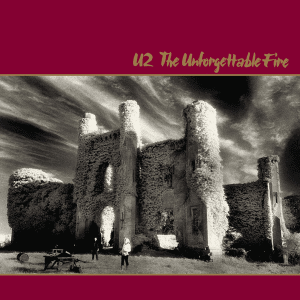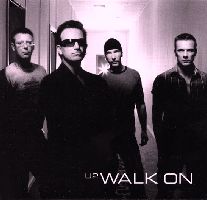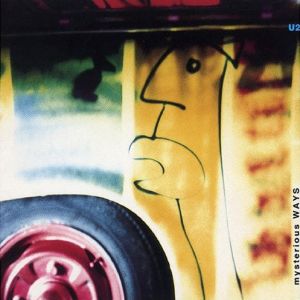Related Research Articles

U2 are an Irish rock band formed in Dublin in 1976. The group consists of Bono, the Edge, Adam Clayton, and Larry Mullen Jr.. Initially rooted in post-punk, U2's musical style has evolved throughout their career, yet has maintained an anthemic quality built on Bono's expressive vocals and the Edge's chiming, effects-based guitar sounds. Bono's lyrics, often embellished with spiritual imagery, focus on personal and sociopolitical themes. Popular for their live performances, the group have staged several elaborate tours over their career.

All That You Can't Leave Behind is the tenth studio album by Irish rock band U2. It was produced by Brian Eno and Daniel Lanois, and was released on 30 October 2000 through Island Records and Interscope Records. Following the band's experimentation with alternative rock and dance music in the 1990s and the mixed reception to their 1997 album, Pop, U2 returned to a sound more akin to their earlier records for All That You Can't Leave Behind. The group reunited with Eno and Lanois, who had produced three prior U2 albums together. The record was originally named "U2000", which had been a working title for their PopMart Tour.

How to Dismantle an Atomic Bomb is the eleventh studio album by Irish rock band U2. It was released on 22 November 2004 in the United Kingdom by Island Records and a day later in the United States by Interscope Records. Much like their previous album All That You Can't Leave Behind (2000), the record exhibits a more mainstream rock sound after the band experimented with alternative rock and dance music in the 1990s. It was produced by Steve Lillywhite, with additional production from Chris Thomas, Jacknife Lee, Nellee Hooper, Flood, Daniel Lanois, Brian Eno, and Carl Glanville.

The Unforgettable Fire is the fourth studio album by Irish rock band U2. It was produced by Brian Eno and Daniel Lanois, and released on 1 October 1984 by Island Records. The band wanted to pursue a new musical direction following the harder-hitting rock of their previous album, War (1983). As a result, they employed Eno and Lanois to produce and assist in their experimentation with a more ambient sound. The resulting change in direction was at the time the band's most dramatic. The album's title is a reference to "The Unforgettable Fire", an art exhibit about the atomic bombing of Hiroshima.

"Stuck in a Moment You Can't Get Out Of" is a song by Irish rock band U2. It is the second track on their tenth studio album, All That You Can't Leave Behind (2000), and was released as the album's second single on 29 January 2001. The band's lead vocalist Bono has said the song was inspired by a fictional conversation with his friend Michael Hutchence about suicide. The song peaked at number 52 on the US Billboard Hot 100 and topped the charts in Canada, their native Ireland and Italy, while reaching the top 10 in Australia, Denmark, Finland, the Netherlands, Norway, Spain and the United Kingdom. In 2002, the song won the Grammy Award for Best Pop Performance by a Duo or Group with Vocal at the 44th Annual Grammy Awards ceremony.

"With or Without You" is a song by Irish rock band U2. It is the third track on their fifth studio album, The Joshua Tree (1987), and was released as the album's lead single on 16 March 1987. The song was the group's most successful single at the time, becoming their first number-one hit in both the United States and Canada by topping the Billboard Hot 100 for three weeks and the RPM national singles chart for one week, with a further three weeks at number two.

"Beautiful Day" is a song by Irish rock band U2. It is the first track on their tenth studio album, All That You Can't Leave Behind (2000), and was released as the album's lead single on 9 October 2000. The song was a commercial success, helping launch the album to multi-platinum status, and is one of U2's biggest hits to date.

"I Still Haven't Found What I'm Looking For" is a song by Irish rock band U2. It is the second track from their 1987 album The Joshua Tree and was released as the album's second single in May 1987. The song was a hit, becoming the band's second consecutive number-one single on the US Billboard Hot 100 while peaking at number six on the UK Singles Chart.

"Elevation" is a song by Irish rock band U2. It is the third track on their tenth studio album, All That You Can't Leave Behind (2000), and was released as the album's third single on 25 June 2001. The song became the band's 16th number-one single in their native Ireland and their second number one in the Netherlands. It also topped the charts in Canada and reached the top 10 in Australia, Denmark, Finland, Italy, Norway, Scotland, Spain, and the United Kingdom. A different mix of the song, entitled the "Tomb Raider mix", was included on the soundtrack of the 2001 film Lara Croft: Tomb Raider. In 2002, "Elevation" won the Grammy Award for Best Rock Performance by a Duo or Group with Vocal at the 44th Annual Grammy Awards ceremony. The song lent its namesake to the band's 2001 Elevation Tour.

"Walk On" is a song by Irish rock band U2. It is the fourth track on their tenth studio album, All That You Can't Leave Behind (2000). The song was first released in Canada on 20 February 2001, then was given a UK release in November of the same year; it was the album's second single in Canada and the fourth internationally. The song was written about Burmese academic Aung San Suu Kyi, who was the chairperson of the National League for Democracy and was placed under house arrest from 1989 until 2010 for her pro-democracy activities, which led to the song being banned in Burma. In 2002, the song won the Grammy Award for Record of the Year at the 44th Annual Grammy Awards ceremony, marking the first time an artist had won the award for songs from the same album in consecutive years.

"Mysterious Ways" is a song by Irish rock band U2. It is the eighth track from their 1991 album, Achtung Baby, and was released as the album's second single on 2 December 1991. The song began as an improvisation called "Sick Puppy", with the band liking only the bass part that bassist Adam Clayton composed. The band struggled to build a song from it, with vocalist Bono and producer Daniel Lanois arguing intensely during one songwriting session. The song's breakthrough came after guitarist the Edge began experimenting with the Korg A3 effects unit. "Mysterious Ways" features a danceable beat, funky guitar hook, and conga-laden percussion, as well as mystical lyrics by Bono about romance and women.
"Bullet the Blue Sky" is a song by Irish rock band U2, and is the fourth track from their 1987 album The Joshua Tree. Lyrically, the song was inspired by a trip that lead vocalist Bono made to Nicaragua and El Salvador, where he saw firsthand how local peasants were affected by United States military intervention in the region. Angered by what he witnessed, Bono asked guitarist the Edge to "put El Salvador through an amplifier." "Bullet the Blue Sky" is one of the band's most overtly political songs, with live performances often being heavily critical of political conflicts and violence.
"Zoo Station" is a song by Irish rock band U2. It is the opening track from their 1991 album Achtung Baby, a record on which the group reinvented themselves musically by incorporating influences from alternative rock, industrial, and electronic dance music. As the album's opening track, "Zoo Station" introduces the band's new sound, delivering industrial-influenced percussion and several layers of distorted guitars and vocals. Similarly, the lyrics suggest the group's new intents and anticipations. The introduction, featuring an "explosion" of percussion and a descending glissando for a guitar hook, was meant to make the listener think the album was mistakenly not U2's latest record or that their music player was broken.
"Until the End of the World" is a song by rock band U2 and the fourth track from their 1991 album Achtung Baby. The song began as a guitar riff composed by lead vocalist Bono from a demo, which the band revisited with success after talking with German filmmaker Wim Wenders about providing music for his film Until the End of the World. The song's lyrics describe a fictional conversation between Jesus Christ and Judas Iscariot. The first verse discusses the Last Supper; the second is about Judas identifying Jesus with a kiss on the cheek in the Garden of Gethsemane; and the final is about Judas' suicide after being overwhelmed with guilt and sadness.
"Bad" is a song by Irish rock band U2 and the seventh track on their 1984 album, The Unforgettable Fire. Thematically, the song is about heroin addiction, though lead vocalist Bono has given varying accounts of who was the inspiration behind his lyrics. "Bad" is considered a fan favourite and is one of U2's most frequently performed songs in concert. The band's 12-minute performance of the song at the Live Aid charity concert in 1985 was a breakthrough moment for them.
"Kite" is a song by Irish rock band U2. It is the fifth track on their 2000 album All That You Can't Leave Behind.
"One Step Closer" is a song by Irish rock band U2, and is the ninth track on their 2004 studio album, How to Dismantle an Atomic Bomb.
"In a Little While" is a song by Irish rock band U2 and the sixth track on their 10th studio album, All That You Can't Leave Behind (2000). Although it was not released as a single from the album, it became a hit on adult album alternative radio in the United States, reaching number one on the Billboard Triple-A chart for a single week in March 2002.

"The Ground Beneath Her Feet" is a song by Irish rock band U2. It appears in the 2000 film The Million Dollar Hotel, which was produced by U2 lead vocalist Bono, and the song was included on the film's soundtrack. Author Salman Rushdie is credited as the lyricist, as the words are taken from his 1999 book The Ground Beneath Her Feet. Written during the recording sessions for U2's album All That You Can't Leave Behind (2000), the song features Daniel Lanois, who played pedal steel guitar. A different mix from the soundtrack version appears in the film. "The Ground Beneath Her Feet" was released as a promotional single in February 2000, reaching number two on the US Billboard Adult Alternative Songs chart, number 22 in Canada, and number one in Iceland.
"When I Look at the World" is a song by Irish rock band U2, and the ninth track on their 2000 album All That You Can't Leave Behind.
References
Footnotes
- 1 2 3 4 McCormick (2006), p. 300
- 1 2 3 4 Stokes (2005), pp. 159–160
- 1 2 Fox, Darrin (January 2001). "Basic Instincts: The Edge Brings the U2 Sound Full Circle". Guitar Player . Vol. 35, no. 1. pp. 100–108.
- ↑ "Feedback". Guitar Player . Vol. 35, no. 4. April 2001. p. 19.
- ↑ U2: Biting Pop's Arse - MTV.com feature, January 2001
- ↑ A Sort of Homecoming - All That You Can't Leave Behind Feature from Amazon.co.uk
- ↑ U2 Vertigo Tour - "New York" statistics
- ↑ U2 All That You Can't Leave Behind Promo Tour - set list from Oct. 19, 2000
- ↑ "U2 rocks JACC" Archived 2013-02-05 at archive.today - review by Tim Collins, Notre Dame Observer, Oct. 11, 2001
- ↑ U2 Vertigo Tour - set list from Dec. 2, 2001
Bibliography
- Stokes, Niall (2005). U2: Into the Heart – The Stories Behind Every Song. New York: Thunder's Mouth Press. ISBN 1-56025-765-2.
- U2 (2006). McCormick, Neil (ed.). U2 by U2 . London: HarperCollins. ISBN 0-00-719668-7.
{{cite book}}: CS1 maint: numeric names: authors list (link)